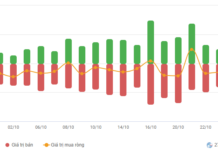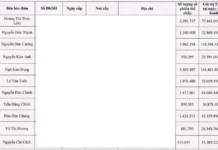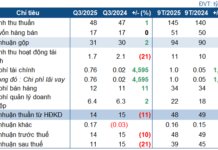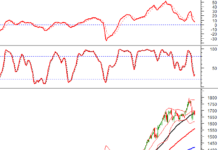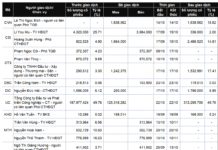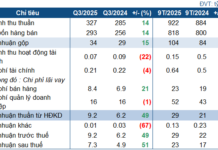US Has Not Recognized Vietnam as a Market Economy
By Cat Lam
On August 2, 2024, the Vietnamese Ministry of Industry and Trade announced that the US Department of Commerce has decided not to recognize Vietnam as a market economy country, despite the country’s notable positive changes.
According to the Ministry of Industry and Trade, Vietnam’s economy has undergone remarkable transformations and development over the past two decades. Vietnam has successfully signed and implemented 17 free trade agreements, including new-generation, high-standard agreements with the European Union, CPTPP countries, and the United Kingdom. These agreements encompass comprehensive commitments ranging from tariff reductions to enhanced labor standards, environmental protection, sustainable development, government procurement, and transparency.
Moving forward, the Ministry of Industry and Trade will study and analyze the arguments in the US Department of Commerce’s report on Vietnam’s economy. This will enable them to supplement and improve their arguments before submitting a request for the US to reconsider Vietnam’s market economy status. This aligns with the goal of concretizing the Vietnam-US Comprehensive Strategic Partnership, thereby promoting bilateral economic, trade, and investment cooperation to bring practical benefits to businesses and people of both countries.
Mr. Nguyen Quang Huy, CEO of the Faculty of Finance and Banking at Nguyen Trai University, shared his insights on this issue.
 |
Mr. Nguyen Quang Huy |
What disadvantages will Vietnam face due to not being recognized as a market economy by the US?
This decision will significantly impact Vietnamese exports to the US market. Firstly, exporting businesses to the US will face discrimination in anti-dumping and countervailing duty investigations. They may have to use third-country prices for comparison when calculating dumping margins, leading to higher risks of being concluded as dumping and subsequently facing high import taxes to restrict their sales in the US. This pushes up the dumping margins to levels that do not accurately reflect the actual production situation of Vietnamese enterprises.
Secondly, there are risks and costs involved, both in terms of time and money, when serving investigations, providing information, and making explanations, which slow down the circulation of goods, increase storage costs, and expose businesses to exchange rate risks. There is also the risk of input price fluctuations, delayed delivery times, and missed business opportunities.
Lastly, Vietnam may be subject to the US applying a country-wide duty rate, which is the tax rate for businesses that do not cooperate or cannot prove they are not controlled by the government.
What factors need to be improved to gain recognition as a market economy?
Vietnam needs to closely follow the six criteria used to determine whether a country has a market economy. These criteria include: (i) currency convertibility; (ii) wage negotiations between workers and employers; (iii) foreign investment levels in economic activities; (iv) state ownership and private ownership issues; (v) government control over certain resources and prices; and (vi) other factors.
In parallel, Vietnam should continue its transition and institutional reforms, improve information provision and coordination in providing explanations, and encourage the international community, businesses, associations, and influential individuals and organizations in the US to contribute objective and constructive information, perspectives, and support during the evaluation and approval process of recognizing Vietnam as a market economy.
At the same time, administrative reforms, institutional improvements, a streamlined management system, digital transformation, green transition, business community support, legal assistance to foreign investors, macro stability, consistent investment attraction policies, and accelerated IPOs of state-owned enterprises are crucial. Upgrading the stock market and actively participating in new-generation free trade agreements will create positive changes in achieving recognition as a market economy.
What benefits will Vietnam gain once recognized as a market economy?
The first benefit of being recognized as a market economy is gaining an advantage in anti-dumping and countervailing duty investigations. Additionally, it will reduce resource wastage in serving such investigations, lower import and export taxes for goods exported to the US, and minimize the risk of being investigated for dumping and subsidies. This will accelerate the circulation and penetration of Vietnamese exports into the US market, helping us seize market opportunities.
On August 6, 2024, Costa Rica became the 73rd country to recognize Vietnam as a market economy. How do you assess the difference when the US recognizes it?
Costa Rica is a member of the World Trade Organization (WTO) and the Organization for Economic Cooperation and Development (OECD), comprising 38 countries with the most developed market economies worldwide. Costa Rica’s recognition of Vietnam as a market economy in anti-dumping and countervailing duty investigations is significant. Meanwhile, US regulations are more complex, requiring the simultaneous fulfillment of all six criteria when assessing a country’s market economy status.
During this time, we should persistently provide additional information and documents to the US while also increasing the number of countries recognizing Vietnam as a market economy to create an encompassing international consensus. This will facilitate the US and the remaining countries in recognizing Vietnam as a market economy.
Thank you, Mr. Huy, for your valuable insights.
Expansion of International Textile and Apparel Businesses into Vietnam
Mr. Le Hoang Tai, Deputy Director of the Department of Trade Promotion, Ministry of Industry and Trade, stated this at a press conference introducing the International Exhibition of Textile and Garment Industry and Technology 2024 (VIATT 2024) on February 23.





